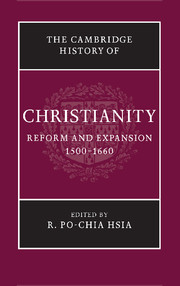Book contents
- Frontmatter
- Part I Luther and the Holy Roman Empire
- Part II The Second Reformation
- 5 Communal Reformation: Zwingli, Luther, and the South of the Holy Roman Empire
- 6 The Calvinist Reformation in Geneva
- 7 The Theology and Liturgy of Reformed Christianity
- 8 The Second Wave of Protestant Expansion
- Part III Catholic Renewal
- Part IV Resolving Confessional Conflicts
- Part V Religion, Society, and Culture
- Part VI Christianity and Other Faiths
- Bibliography
- Index
- References
7 - The Theology and Liturgy of Reformed Christianity
from Part II - The Second Reformation
Published online by Cambridge University Press: 28 March 2008
- Frontmatter
- Part I Luther and the Holy Roman Empire
- Part II The Second Reformation
- 5 Communal Reformation: Zwingli, Luther, and the South of the Holy Roman Empire
- 6 The Calvinist Reformation in Geneva
- 7 The Theology and Liturgy of Reformed Christianity
- 8 The Second Wave of Protestant Expansion
- Part III Catholic Renewal
- Part IV Resolving Confessional Conflicts
- Part V Religion, Society, and Culture
- Part VI Christianity and Other Faiths
- Bibliography
- Index
- References
Summary
The historians of early modern science have taught us the postmodern lesson that there is a ‘social history’ of truth. The claims to scientific knowledge based on experiment and observation that were advanced by the protagonists of the ‘new science’ in the later seventeenth century were reliant on suppositions about whose observation was to count, what experiment was to be relied on, and what constituted a scientific truth. Although the Protestant theologians and divines of the age of the Reformation would have rejected any such notion — God’s truth being revealed, eternal, and immutable — the fact is that the Reformed Protestant theological and liturgical tradition was framed in a context in which the reformers themselves redefined what constituted religious truth and how it was validated.
‘By faith alone’ (sola fide) was Luther’s redefinition. ‘Scripture alone’ (sola scriptura) was the Protestant reformers’ sensational means of validating it. The latter was the route by which Protestants proclaimed that the church could return to its roots — the gospel of Christ and the church of His earliest followers. The doctrine was corrosive of the accretion of normative traditions in the councils of the church, the proclamations of Rome and the works of scholastic theologians. Luther’s central critique of the Roman Church was that it was weighed down with human traditions that popes, cardinals and ecclesiastical authorities claimed as ‘holy’, confusing the divine with the human, and arrogating to themselves an authority to proclaim truth that belonged to God alone.
- Type
- Chapter
- Information
- The Cambridge History of Christianity , pp. 104 - 124Publisher: Cambridge University PressPrint publication year: 2007



